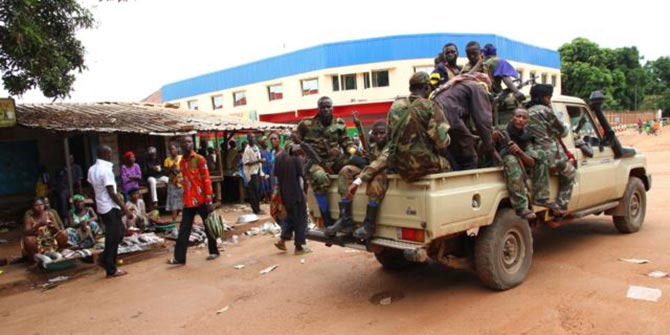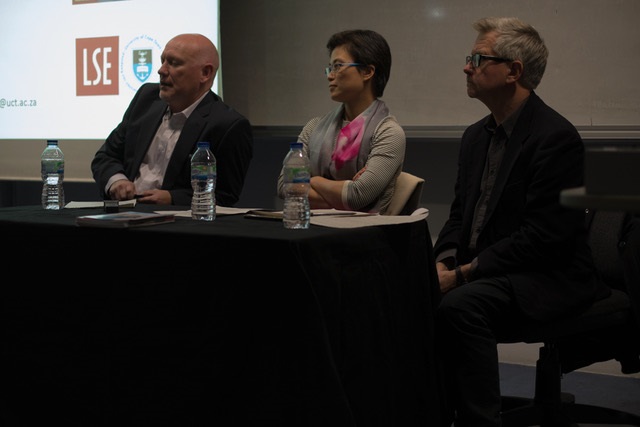The sports pages of newspapers provide a unique insight into political conflicts and solidarities. Schler and Dubinsky examine the coverage of Nigeria’s national football team in the postcolonial press and find both aspirations for unity and an outlet for political discord.
Sports are more than leisure and entertainment. They are also rallying points for communal identities. Football in particular has provided Africans with a means for expressing collective consciousness and nationalist sentiments. To understand how football can bring nations together, but also create new fault lines and conflict, we need to look no further than the sports pages of local newspapers.
Throughout Nigeria’s history, the press has played a dual role of arousing nationalist solidarities and generating political conflict. The Nigerian press has thus embodied the unlikely coexistence between forces for unity and polarisation. Historians of postcolonial Nigeria have reviewed news items, editorials and advertisements to understand the role the press played in shaping a Nigerian identity, but little attention has been paid to the sports pages.
We turned our attention to the discourses surrounding football in the sports pages to get a glimpse into the postcolonial aspirations of Nigerians. Our study reviewed football coverage in the West African Pilot, Daily Express, Daily Times and the Citizen for the period June 1960 to December 1962, looking for evidence of the political tensions that marked Nigeria’s establishment. We also examined how coverage of the national team, the Green Eagles, reflected Nigerians’ hopes for their country, and how they defined ‘Nigerianness’.
Nnamdi Azikiwe was the first to use the sports pages of his West African Pilot as a platform for nationalist politics in the lead up to independence. The paper fuelled a bitter rivalry with Ghana, and each game became an opportunity for rallying national pride. Editorials bashed the Nigerian Football Association (NFA) if they dared to put forth a poor line-up before a game: ‘They should be patriotic enough to be proud in presenting before the outside world what is Nigeria’s best. There is no other way they can do this other than to feel proud that they are citizens of this great nation.’
While coverage of the Green Eagles was infused with nationalist fervour, it also reflected the deep divisions that plagued Nigeria. This could be seen around the lightning rod issue of coaching. During this era, it was commonplace for African teams to hire foreign coaches, as experienced indigenous coaches were lacking. This dependence on white coaches was a contentious issue at the time, and it continues to be. But the NFA’s decision in 1960 to hire an Israeli coach set off additional tensions that were rooted in Nigeria’s regional conflicts.
The Northern region opposed hiring the Israeli, Beit Halevi, for political reasons. The regional premier, the Sardauna Ahmadu Bello, charged that Nigeria should ally with the Arab states in the Middle East conflict, and he opposed ties to Israel. The Southern regions rejected Beit Halevi because they believed that Nigeria deserved a coach from one of the more prestigious European nations, rather than a second-rate country. Emotions around the issue ran high, particularly when the team lost several matches after Beit Halevi’s arrival. The string of bad results generated a hard-hitting uproar in the sports pages, with personal attacks against the new coach for being too old, uninspiring and for not speaking English.
Just as opposition to Beit Halevi was linked to postcolonial politics, the improvement in the coach’s standing in the eyes of the press was also related to nationalist identification. In April 1961, the national football team drew with Ghana on two consecutive matches, and Nigerian fans celebrated these outcomes as resounding moral victories. The West African Pilot heaped praise on the team after the first match: ‘I thought that the first 45 minutes was one of the fightingest football I ever saw’. In the Daily Times report, Beit Halevi was called ‘the architect of Nigeria’s recovery’. The Sunday Post also claimed that Nigeria’s success was ‘a credit to the coaching acumen of Moishe Beth Halevi’.
Notably, the Citizen, published in the Northern Region, carried very little coverage of the national football team in general, and there was no mention of Beit Halevi’s role in the team’s successes. This was not exceptional, as our review of the Citizen found many stories about cricket and football matches taking place in the North, but little interest in sporting events centered in Lagos. We linked this to deeper political conflicts and competition between the Northern, Western and Eastern regions that plagued Nigeria’s First Republic. The Citizen’s lack of identification with the national team was another expression of the regional tensions that threatened Nigerian unity, and demonstrated that the silences of the sports pages also offer insights into politics.
No other incident gave better expression to the links between national consciousness and football in the early years of independence than the games that Nigeria played against Tunisia at the end of 1961 as qualifiers for the 1962 Africa Cup. The first of the two games took place in Lagos, ending in a 2-1 victory for the Green Eagles.
The second game was held in Tunisia, and it quickly devolved into a political fiasco. The referee, an Egyptian, approved a controversial Tunisian goal. The Nigerians were infuriated by what they saw as extreme bias, and the team stormed off the pitch in protest. They lost the game and their place in the Africa Cup, paving the way for the Egyptians to secure a better position for themselves.
Sports writer Bonar Ekanem accused the Egyptians of being prejudiced by pan-African political rivalries. Egypt favored Ghana over Nigeria because both were members of the Casablanca group of states, while Nigeria was part of the Monrovia group. Ekanem wrote:
‘Nothing on earth could have made Nigeria win that match with the Casablanca prestige so thickly involved. Egypt, herself, has a score to settle with Nigeria for not recognising her leadership in Africa … What took place in the Tunisian Stadium was football not played according to the written rules obeyed by all soccer nations. It was purely the Casablanca Bloc type of football that has no written rules.’
Our study confirmed that sportswriting has never been just about sports, and the sports pages are an underappreciated source for viewing political conflicts and solidarities. The narratives of nationalist fervour expressed by Green Eagles supporters and journalists offered new insights into popular aspirations that accompanied independence in Nigeria, and the ways that sports rallied them.
Photo by Nicolene Olckers on Unsplash





